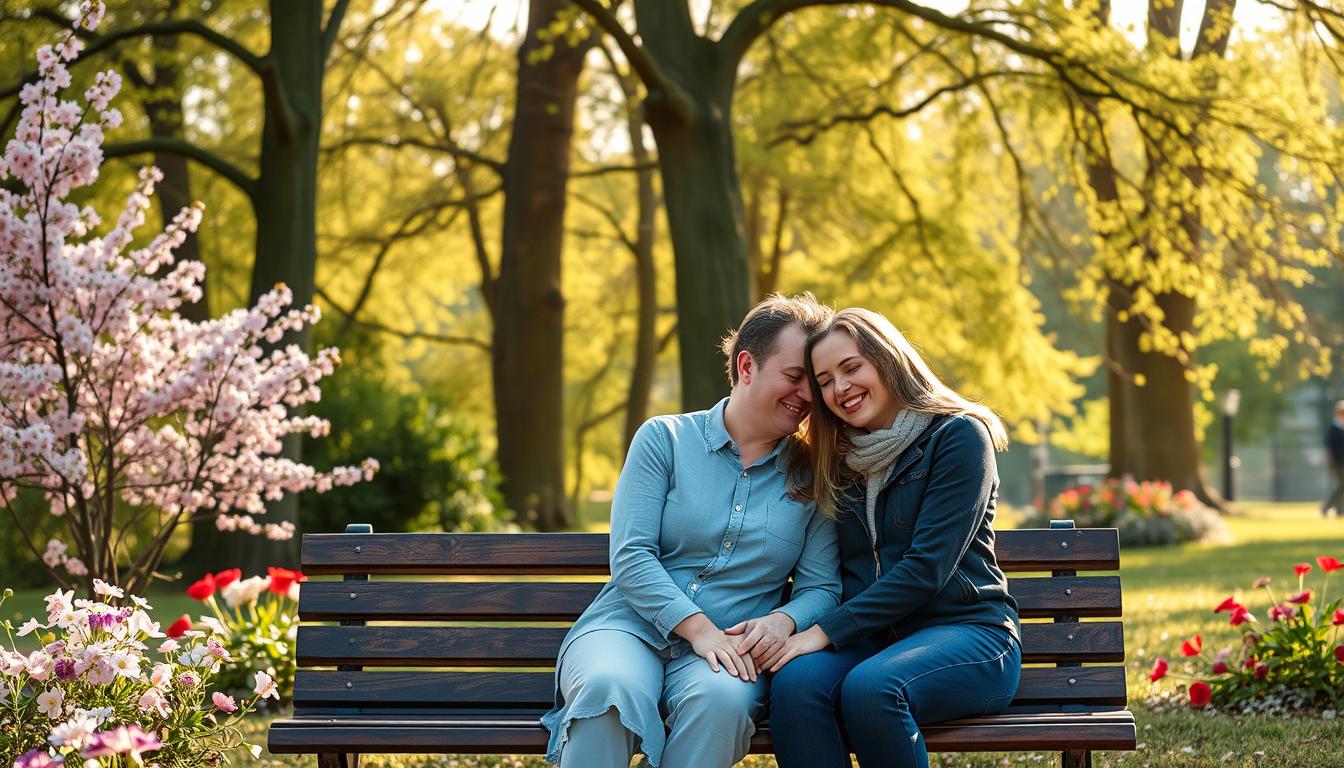Relationships are often seen through grand gestures or the initial passion. Yet, the real strength comes from everyday kindness, mutual respect, and enduring commitment. Having navigated various relationships, I’ve found that the signs of a healthy bond are subtle yet deeply meaningful.
A healthy relationship is grounded in trust, open dialogue, and effective conflict resolution. It’s a space where both feel heard, valued, and supported in their personal pursuits. Such a relationship enhances your growth, challenges you, and ensures you’re safe to be yourself.
Key Takeaways
- Mutual respect and healthy boundaries are the bedrock of a healthy relationship.
- Open and honest communication, even during conflicts, is essential for building trust and resolving issues.
- Shared values, compatible life goals, and the ability to support each other’s personal growth are hallmarks of a strong partnership.
- Healthy relationships foster a sense of emotional safety and security, allowing both partners to be vulnerable and authentic.
- Successful relationships require a delicate balance between individuality and togetherness, adapting to life’s changes together.
What is a Healthy Relationship?
A healthy relationship is grounded in empathy, kindness, and reliability. It also thrives on commitment, mutual respect, and shared values. These elements create a bond of trust, foster open communication, and help resolve conflicts. They also encourage personal growth and support for each other.
Key Characteristics of a Healthy Relationship
In a healthy relationship, partners exhibit:
- Mutual Respect: They honor each other’s boundaries, opinions, and personal needs.
- Shared Values: They align on goals, beliefs, and priorities that shape their relationship.
- Commitment: They are steadfast in their dedication, facing challenges together.
- Teamwork: They support each other’s personal and professional development.
- Empathy: They grasp and acknowledge each other’s emotions, fostering a safe dialogue.
- Reliability: They can count on each other, trusting in their partner’s promises.
While healthy relationships face hurdles, they are defined by mutual care, understanding, and a common future vision.
“The greatest gift you can give another is the purity of your attention.” – Richard Moss
Signs of a Healthy Relationship
Respect and Healthy Boundaries
Mutual respect and healthy boundaries are essential for a thriving relationship. Couples in a healthy dynamic respect each other’s emotions, interests, and personal needs without judgment. They also respect each other’s emotional and physical boundaries, allowing for individual growth and fulfillment.
Respecting your partner as a unique individual is crucial for a relationship to truly flourish. Healthy couples make room for activities, friendships, and aspects of their lives that are separate from the partnership. This mutual understanding and acceptance of individual needs fosters a stronger, more resilient connection.
When mutual respect and healthy boundaries are present, couples feel safe to be vulnerable. They can express themselves openly and support each other’s personal development. This foundation of trust and understanding is the bedrock of a relationship that stands the test of time.
“The highest form of maturity is to allow yourself to be surprised by life and to feel deeply.” – Anaïs Nin
By honoring each other’s emotional and physical boundaries, healthy couples create a space where they can thrive. This delicate balance is the key to a fulfilling, long-lasting relationship.
Trust and Commitment
In a healthy relationship, trust and commitment are crucial for its longevity. Trust means believing your partner will be faithful, reliable, and care for your well-being. This trust grows as they consistently show their reliability and fidelity over time.
Commitment to the relationship, even in tough times, strengthens trust. Healthy couples are dedicated to making their relationship succeed and facing challenges together. They see commitment as a choice, not just a feeling, to prioritize the relationship and each other’s needs.
“The greatest gift you can give another is the purity of your attention.” – Richard Moss
With trust and commitment, partners feel secure, knowing they can count on each other. This predictability lets them be open, honest, and vulnerable, deepening their connection.
Building trust and commitment in a relationship takes effort, communication, and a readiness to tackle challenges. By focusing on these key elements, couples can create a strong base of fidelity and reliability that lasts.
Open Communication and Conflict Resolution
Healthy relationships rely on open communication. It’s crucial for couples to feel at ease expressing their thoughts, feelings, and needs, even when it’s hard. Active listening, empathy, and a readiness to find compromise during conflicts are essential. Healthy couples tackle disagreements directly, aiming to grasp each other’s viewpoints and discover solutions that both can accept.
Effective Communication Strategies
Employing effective communication strategies is vital for keeping open communication in relationships alive and resolving disputes. These include:
- Using “I” statements to express feelings and needs
- Active listening and seeking to understand the other person’s point of view
- Focusing on resolving the issue at hand rather than attacking each other
- Being willing to compromise and find solutions that work for both partners
By adopting these strategies, couples can manage conflict resolution in a constructive way. This strengthens their bond and keeps their relationship fulfilling.
“Healthy couples address conflicts head-on, seeking to understand each other’s perspectives and find mutually agreeable solutions.”
Ability to Disagree and Forgive
Healthy relationships rely on the ability to disagree and forgive respectfully. Disagreements are a natural part of any relationship. However, how couples handle these conflicts is what truly matters. It’s essential to approach disagreements with emotional maturity. This means seeking to understand each other’s viewpoints and finding common ground.
Forgiveness is also key for maintaining trust and resilience. When partners show the emotional maturity to forgive, it strengthens their bond. This ability to forgive helps them overcome resentments, crucial for conflict resolution and trust building.
“The weak can never forgive. Forgiveness is the attribute of the strong.”- Mahatma Gandhi
Couples who can disagree respectfully and forgive each other show high emotional intelligence. This skill is essential for long-term success in any relationship. It allows them to navigate disagreements in relationships and cultivate forgiveness, marking a truly healthy partnership.
By adopting these skills, couples can enhance their trust and emotional maturity. This fosters a relationship that can face and overcome any challenges that come their way.
Signs you’re in a healthy relationship
Identifying the signs of a healthy relationship is vital for a fulfilling partnership. Beyond the key indicators, several other signs indicate a thriving relationship. These include feeling genuinely supported and cared for, consistently enjoying each other’s company, making collaborative decisions, and having the approval and support of friends and family.
The healthiest relationships promote a sense of safety, empowerment, and authenticity. You should feel free to be your true self with your partner, without fear of judgment. Healthy couples celebrate each other’s unique qualities and encourage personal growth, rather than trying to change or control one another.
- You feel safe, respected, and valued in the relationship.
- You and your partner make decisions together as a team.
- Your friends and family approve of and support your relationship.
- You can be your authentic self without fear of judgment or criticism.
- You regularly express appreciation and gratitude for each other.
A healthy relationship empowers both partners to thrive and flourish, individually and as a couple. Recognizing these signs ensures your relationship remains a source of joy, fulfillment, and personal growth.

“The best relationship is one in which your love for each other exceeds your need for each other.”
Healthy Relationships Promote Growth
Healthy relationships are more than just maintaining a comfortable status quo. They actively foster personal growth for both partners. In a thriving relationship, each person feels encouraged and supported to pursue their interests, aspirations, and self-improvement goals. Partners uplift and champion each other’s dreams, whether it’s starting a new business, going back to school, or exploring a creative passion.
Signs of Personal Growth
As partners nurture and support each other’s individual development, the relationship becomes a catalyst for personal growth. Over time, this mutual encouragement leads to tangible signs of growth. These include:
- Increased confidence and self-assurance
- Expanded horizons and a broader worldview
- A stronger sense of identity and purpose
- Enhanced problem-solving and decision-making skills
- The pursuit of new interests and hobbies
When partners in a healthy relationship feel empowered to pursue their goals and explore their full potential, the benefits resonate throughout the relationship. This strengthens the bond and fosters even greater relationship growth.
“The more you support your partner’s goals and dreams, the more you’ll see them thrive and the stronger your relationship will become.”
Ultimately, the healthiest relationships serve as a springboard for mutual personal growth and individual development. They allow both partners to blossom and reach new heights together.
Trust and Safety in the Relationship
At the heart of a healthy relationship lies a foundation of trust and safety. Partners in a thriving relationship feel comfortable being emotionally vulnerable with one another. They are confident that their thoughts, feelings, and needs will be met with care and respect. This confidence allows them to count on each other to be reliable, faithful, and have their best interests in mind. Such a profound sense of safety and security enables the relationship to deepen and flourish over time.
Trust is the cornerstone of any meaningful relationship. When partners trust each other, they can openly express their emotional vulnerability. They know their partner will respond with empathy and understanding. This fosters a deep level of intimacy and allows the relationship to grow and evolve.
A sense of safety is crucial for partners to feel secure in the relationship. When partners feel safe, they are more likely to take risks and share their authentic selves. They engage in predictable behavior that reinforces the stability of the relationship. This feeling of safety enables partners to be vulnerable and build strong emotional connections.
“Trust is the glue of life. It’s the most essential ingredient in effective communication. It’s the foundational principle that holds all relationships.”
– Stephen Covey
Ultimately, trust and safety in a relationship are essential for partners to feel comfortable and secure in their bond. By fostering an environment of mutual trust and a sense of emotional safety, couples can create a strong foundation. This foundation is crucial for a healthy, fulfilling, and long-lasting relationship.
| Characteristics of Trust in Relationships | Indicators of Emotional Safety |
|---|---|
|
|
Intimacy and Physical Connection
Healthy relationships are built on both emotional and physical closeness. Couples who enjoy a fulfilling physical connection feel at ease discussing affection. They respect each other’s sexual boundaries and openly share desires. This is key to a harmonious physical relationship.
Healthy couples also value non-sexual physical closeness. Activities like cuddling, hand-holding, and sleeping together enhance emotional bonding. These actions contribute to a deeper intimacy in relationships. Physical connection in all its forms strengthens the bond between partners, fostering trust and understanding.

“Intimacy is not just about sex. It’s about feeling safe, understood, and accepted by your partner.”
To maintain a healthy balance, open communication and mutual respect are crucial. Couples must be willing to explore each other’s needs. By nurturing this connection, they can create a fulfilling and lasting relationship.
Teamwork and Decision Making
Healthy relationships are founded on relationship teamwork. Partners in a thriving relationship collaborate to make decisions. They listen to each other’s views and find compromises that respect both individuals’ needs and goals. This joint decision-making ensures neither partner feels left out or dominated, even with differing individual and shared goals.
The essence of successful teamwork in a relationship lies in open and honest communication. Couples must express their thoughts, feelings, and concerns freely. They also need to listen actively to their partner. This enables them to balance individual priorities with their shared vision for their relationship and future.
Collaborative Decision-Making Process
An effective collaborative decision-making process in a relationship involves several steps:
- Openly discuss the issue or decision at hand, with both partners sharing their perspectives and concerns.
- Actively listen to each other, trying to understand the reasoning and values behind each person’s position.
- Explore possible compromises or solutions that address both partners’ needs and goals.
- Reach a mutually agreeable decision that satisfies the relationship’s shared interests.
- Commit to the decision and work together to implement it effectively.
By adopting this collaborative approach, couples can tackle tough decisions. This strengthens their relationship teamwork and joint decision-making abilities. The outcome is a relationship grounded in mutual respect, trust, and a shared vision for the future.
“The strength of the team is each individual member. The strength of each member is the team.” – Phil Jackson
External Support for the Relationship
Healthy relationships often benefit from the opinions of loved ones. While the couple’s own assessment is key, family and friend approval can offer valuable insights. It serves as a gauge of relationship health.
Major concerns from those who care about you and your well-being are worth considering. Healthy relationships usually have the support of loved ones. They provide an outside view on the relationship’s strengths and areas for growth.
Building a strong social support system is essential. It strengthens the bond between partners and offers a sounding board for life’s challenges. When family and friends approve, it boosts confidence and security, showing you’re on the right path.
However, persistent concerns about the relationship’s health from loved ones should not be ignored. Their insights, driven by a desire to see you thrive, can reveal issues you might have missed.
| Importance of External Support | Benefits of Loved Ones’ Approval |
|---|---|
| Provides an outside perspective on relationship health | Reinforces the strength and stability of the relationship |
| Offers a valuable sounding board for navigating challenges | Instills a sense of confidence and security in the couple |
| Highlights potential issues that may have been overlooked | Encourages the couple to maintain a healthy, supportive dynamic |
While friends and family opinions shouldn’t dictate the couple’s assessment, external support and approval are significant. They indicate a relationship’s health and wellbeing. A supportive network of loved ones can significantly boost a couple’s chances of a lasting, fulfilling partnership.
Red Flags in Unhealthy Relationships
Healthy relationships are founded on mutual respect, trust, and open communication. However, unhealthy dynamics can be more subtle. It’s vital to recognize common relationship red flags to protect your well-being and nurture a positive partnership.
Warning Signs to Watch For
One clear indicator of an unhealthy relationship is controlling behavior from your partner. This might include limiting your independence, restricting friendships and family ties, or making decisions without your consent. A lack of respect for your boundaries is also a red flag. Feeling unsafe or unable to express disagreement is another warning sign.
- Constant criticism or put-downs that undermine your self-esteem
- Excessive jealousy or possessiveness over your time and attention
- Withholding affection or emotional support as a form of punishment
- Gaslighting or other forms of emotional abuse
If you consistently feel anxious, isolated, or on edge in your relationship, it’s a red flag. It may be time to reassess the relationship. Seeking professional help can offer clarity and guide you towards a healthier path.

“The beginning of love is the will to let those we love be perfectly themselves, the resolution not to twist them to fit our own image. If in loving them we do not love what they are, but only their potential likeness to ourselves, we do them violence. We do not love them, we only love the reflection of ourselves we find in them.” – Thomas Merton
Balancing Individuality and Togetherness
Maintaining a healthy relationship demands a fine balance between individual identity and interdependence. Successful couples respect each other’s personal space and boundaries. They find joy in their shared experiences.
One key to a vibrant relationship is allowing each partner to explore their interests and grow. This individual identity is vital. It prevents the couple from becoming too dependent, which can stifle personal development.
Yet, the interdependence of the relationship is what builds a deep connection. When couples support each other’s dreams and celebrate their successes, they create a strong bond. This sense of togetherness strengthens their relationship.
Respecting personal space and boundaries is essential for this balance. Couples need to create a space where they can express their needs. This could be time for individual hobbies or private reflection. Such mutual respect allows the relationship to flourish, making each partner feel valued and fulfilled.
“The best relationships don’t demand all of your time, all of your energy, or all of your love. The best relationships inspire you to be your best self.”
By understanding the interplay between individual identity, interdependence, and personal space and boundaries, couples can build a relationship that is both deeply connected and empowering.
Adapting to Life’s Changes
Healthy relationships are dynamic, evolving with the people and situations around them. The ability to navigate life’s changes with flexibility and empathy marks a strong partnership. Relationship adaptability, navigating life transitions, and evolving needs and goals are key. They help couples reshape their bond to meet both partners’ changing needs.
Couples in healthy relationships don’t cling to a fixed idea of their partnership. Instead, they approach life’s changes with curiosity and a readiness to reimagine their bond. Open talks about shifting priorities and personal growth help them find ways to adapt together.
Adaptability doesn’t mean sacrificing one’s core values or identity. It’s about finding a balance between personal fulfillment and shared goals. Healthy couples manage this balance, ensuring both partners’ evolving needs and goals are respected and met.
“The resilience to navigate life’s inevitable changes is a true testament to the strength of a relationship.”
By embracing relationship adaptability, couples deepen their understanding and appreciation for each other’s paths. This flexibility allows them to face challenges, celebrate victories, and renew their commitment to each other as their lives change.
The ability to navigate life transitions with grace and openness is a sign of a healthy, thriving relationship. When partners evolve together, their bond strengthens, enduring through time.
Conclusion
Healthy relationships are rooted in mutual respect, trust, and open communication. They also require a shared commitment to each other’s growth and wellbeing. Recognizing the signs of a thriving partnership helps individuals assess their own relationships. This allows them to identify areas for improvement.
It’s crucial to remember that relationship health varies from one to another. The specific needs and dynamics differ. Reflecting on the characteristics of healthy relationships can help you evaluate your connections. This reflection can reveal opportunities to strengthen them.
The importance of self-reflection cannot be overstated. If you have concerns about your relationship, seeking support is key. A counselor or trusted loved ones can offer valuable perspectives. They can help you navigate through challenges.
Cultivating a healthy relationship demands ongoing dedication and flexibility. Prioritizing your partner’s needs and the relationship’s growth is essential. This approach fosters a bond that not only endures but also empowers you both to reach new heights.
FAQ
What are the key characteristics of a healthy relationship?
Psychotherapist Natacha Duke highlights empathy, kindness, and reliability as key. Commitment, mutual respect, and teamwork are also crucial. Having similar values and goals is essential.
What are the signs of a healthy relationship?
Respect, trust, and effective communication are signs of a healthy bond. The ability to disagree and forgive is vital. Commitment, kindness, and enjoying each other’s company are also important. Supporting each other’s goals is key.
Why are respect and healthy boundaries important in a relationship?
Respect and boundaries are vital for a strong relationship. They allow for emotional space and personal needs without judgment. Healthy couples respect each other’s boundaries, whether it’s time with friends or financial independence.
How do trust and commitment contribute to a healthy relationship?
Trust and commitment are crucial for a lasting relationship. Trust means believing in your partner’s faithfulness and reliability. Commitment strengthens this trust, even through challenges.
What are the key elements of effective communication in a healthy relationship?
Open, honest communication is vital. Couples should feel free to express their thoughts and feelings. Active listening, empathy, and compromise are essential when conflicts arise.
How do healthy couples navigate disagreements and forgive each other?
Healthy couples can disagree respectfully and seek understanding. They find compromises and forgive each other. Emotional maturity allows them to move past resentments.
What are some other signs that a relationship is healthy?
Feeling supported and cared for is a sign of a healthy relationship. Enjoying each other’s company and making decisions together are also indicators. The approval of friends and family is important.
How do healthy relationships foster personal growth for both partners?
Healthy relationships encourage personal growth. Each partner feels supported in pursuing their interests and aspirations. This fosters self-improvement.
What role do trust and safety play in a healthy relationship?
Trust and safety are foundational. Partners feel comfortable being vulnerable, knowing their needs will be respected. This creates a safe space for emotional openness.
How do healthy relationships nurture emotional and physical intimacy?
Healthy relationships foster both emotional and physical closeness. Couples discuss and respect physical affection, from cuddling to sex. Open communication about desires is key.
What role does teamwork and collaborative decision-making play in a healthy relationship?
Teamwork is essential in a healthy relationship. Partners make decisions together, considering each other’s perspectives. This fosters a sense of unity and cooperation.
How can the opinions of friends and family impact the assessment of a relationship’s health?
While friends and family opinions are valuable, they shouldn’t dictate a relationship’s health. However, widespread concerns from loved ones can prompt a closer look at the relationship.
What are some red flags that may indicate an unhealthy relationship?
Red flags include attempts to control or change your partner. A lack of respect for boundaries and spending little quality time together are also warning signs. Feeling unheard or unsafe is a major concern.
How can healthy relationships balance individuality and togetherness?
Healthy relationships respect individuality while valuing togetherness. Each partner maintains their identity and pursues interests. Respecting personal space ensures the relationship remains vibrant.
How do healthy relationships adapt to life’s changes and evolving needs?
Healthy relationships adapt to life’s changes. Partners discuss and accommodate shifting needs and goals. This flexibility ensures the relationship remains strong and supportive.
